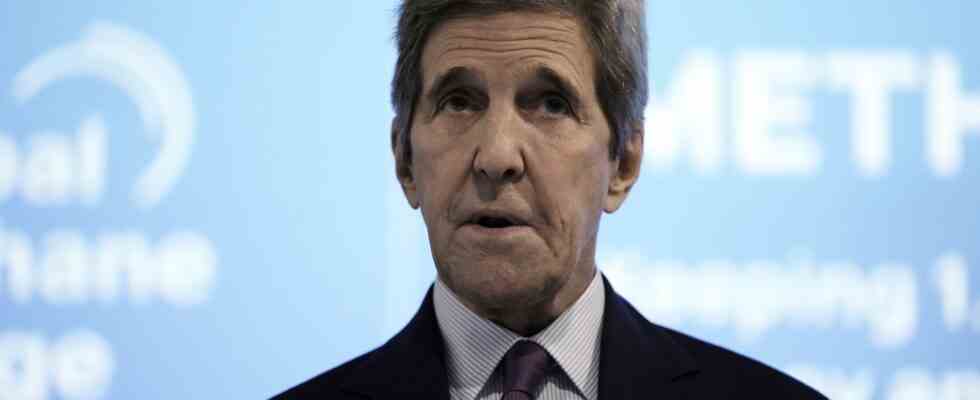Status: 19.11.2022 8:54 a.m
The US climate commissioner Kerry tested positive for Corona – and now has to continue the COP27 negotiations by telephone. in the daily topics-Interview says Foreign Minister Baerbock that there are still “decisive points”.
The struggle for an international climate policy in Sharm El-Sheikh, Egypt, is being extended – and the US climate commissioner, John Kerry, of all people, has to continue the negotiations by telephone. He tested positive for the corona virus and went into isolation with mild symptoms, his spokeswoman said on Friday evening.
“He is working over the phone with his team of negotiators as well as foreign counterparts to ensure a successful outcome of COP27,” the spokeswoman said. Kerry is fully vaccinated and boosted.
The isolation of the US representative should still be a hurdle. The conference is scheduled to end today after last night’s conference went into overtime. The representatives from almost 200 countries struggled to find solutions to contentious issues until late at night – but no agreement was reached.
How does the world intend to halve its emissions?
There is still a problem “on the two crucial points,” said Federal Foreign Minister Annalena Baerbock in an interview with the daily topics. On the one hand, it is about a work program on how the world can halve its greenhouse gas emissions in the coming years. From a European point of view, this means that all industrialized countries report annually on how they are progressing with their climate targets in the individual sectors – transport, buildings, energy – as is already done in the EU.
“But unfortunately this is being blocked, interestingly enough by the countries that are not mostly affected themselves [von einer Berichtspflicht, Anm. d. Red.]”, said Baerbock. “Perhaps also out of concern that they themselves would have to significantly reduce their emissions in the future.”
Annalena Baerbock, Federal Foreign Minister, where are the negotiations at the world climate conference stalling?
daily topics 10:15 p.m., 19.11.2022
Financing of climate damage remains controversial
The second point of contention is the financing of repairing climate damage in poor countries. This particularly affects island states and very poor African countries, said Baerbock. They could no longer cope with the effects of the climate crisis, for example because entire villages would have to be resettled and the countries lacked the resources for this. “They rightly say: ‘We need money for this’. That’s the so-called money for damages and losses.” The EU has already made proposals to better support these countries.
“And here, too, it is unfortunately blocked by other states that also have large emissions,” said Baerbock. Counter-proposals have also been submitted by the group of the so-called G77 countries – countries that see themselves as developing and emerging countries. “But behind it all are the emitters, including China, which already have large emissions today,” said Baerbock. But China is no longer a developing country.
China issue
Like the USA and Europe, China is one of the biggest sources of climate-damaging emissions. Nevertheless, the country wants to continue to be treated as a developing country – as stipulated in the Kyoto Protocol 30 years ago. This is met with a misunderstanding among the donor countries – they no longer want to classify China as a recipient country because of its economic power and its immense emissions of greenhouse gases.
Baerbock says there are various proposals for financing climate damage – including those from the United States, which propose a different procedure than the Europeans. “But to put it briefly, it’s about how we can mobilize so much money together that we can really help with a view to the effects of the climate crisis where people’s survival is, in the truest sense of the word, a matter of survival.”
Is the coal phase-out shaking?
In his own words, Baerbock also sees problems with the exit from coal. Because at the climate conference in Glasgow last year, it was agreed to phase out coal in order to still have a chance of meeting the 1.5 target. “Some don’t want that to be so clear in the text now,” said Baerbock. “That would be a step backwards, in my view a fatal step backwards.” Therefore, the goal remains that the COP27 final document should state that coal will be phased out worldwide.
New hurdle at the climate summit: John Kerry tested positive for Corona
Werner Eckert, SWR, currently Sharm El-Sheikh, 19.11.2022 9:03 a.m

